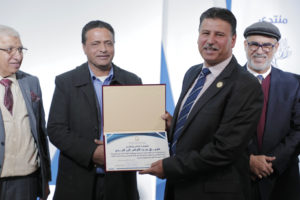This morning, Saturday, January 8, the Libya Revival Forum was held in Benghazi, and under the auspices of the Libya Academy for Advanced Studies, a dialogue entitled: “The environment, its importance, its problems, investing in it,” on the occasion of World Environment Day.
The dialogue session was moderated by Mr. Khaled Bouzakouk, and the session topics were as follows:
The first axis: environmental pollution, types of environmental pollutants, diseases resulting from environmental pollution, reducing environmental pollution. Performed by Dr. Ramadan Salem Sati, a medical biologist. The doctor emphasized that the environment is the key to the existence of life on Earth, and addressed environmental pollution and its types, including thermal and chemical radiation, not to mention audio and visual pollution, and dealt with the accumulation of garbage and not placing sufficient barrels, and what affects the health of the citizen, especially after the process of burning this garbage by some citizens, And the diseases it causes to people living near it. He then addressed the pollution of beaches with oils and plastic objects and their impact on groundwater pollution, as well as the opening of sewage on the beaches, which affects the health of vacationers and causes many diseases. At the end of his participation, he addressed solar energy and encouraged its investment in our country in particular. Libya’s climate is one of the best.
The second axis: Investing in the environment (renewable energy to reduce toxic emissions), how to transform waste into successful investment projects.
Delivered by: Professor Dr. Faraj Boubakar Al-Mabrouk, Professor of Environmental Engineering and Public Health – Faculty of Engineering, University of Benghazi.
He discussed renewable and non-renewable energy, and stressed the inexhaustible renewable energies such as wind and sun, and that their advantages have no alternative, especially since sunlight is available to us throughout the day. He also talked about Jordan’s experience in using sunlight as heaters for homes, as they are safe and inexpensive. The world is moving to invest in these energies through the industries of the future, and he praised the Benghazi municipality’s project to light the city’s streets with renewable energy.
Delivered by: Professor Dr. Faraj Boubakar Al-Mabrouk, Professor of Environmental Engineering and Public Health – Faculty of Engineering, University of Benghazi.
He discussed renewable and non-renewable energy, and stressed the inexhaustible renewable energies such as wind and sun, and that their advantages have no alternative, especially since sunlight is available to us throughout the day. He also talked about Jordan’s experience in using sunlight as heaters for homes, as they are safe and inexpensive. The world is moving to invest in these energies through the industries of the future, and he praised the Benghazi municipality’s project to light the city’s streets with renewable energy.
The third axis: Definition of the urban ecosystem, the importance of urban infrastructure in cities, the percentage of plant coverage in the city of Benghazi.
By Dr. Moneim Wafi Barani, Professor of Plant Ecology at the University of Benghazi and the Libyan Academy.
By Dr. Moneim Wafi Barani, Professor of Plant Ecology at the University of Benghazi and the Libyan Academy.
He spoke about the importance of the environmental dimension in urban planning, and stressed that population statistics confirm that 90% of Libya’s population lives in cities, which requires attention to the cultural environment within cities. Therefore, green spaces must be available inside homes, schools, centers, and hospitals, not to mention public parks. He also stressed the need to maintain rain drainage networks, and the importance of using and recycling polluted water.
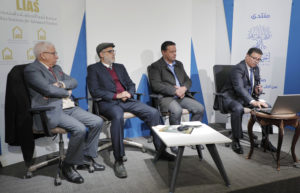
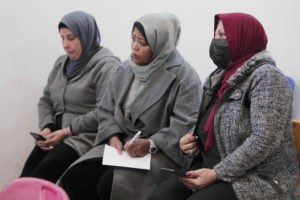
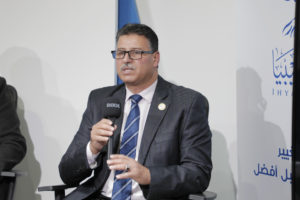
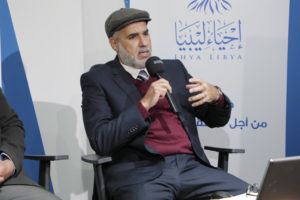
At the conclusion of the topics, the discussion was opened with the attendees, for enrichment through questions, inquiries, and additions, and an invitation and call for a clean life in the present and the future, and attention to the environment because it is the sources of the continuity of life, linked to plants, animals, humans, and natural sources.
Some personalities interested in the environment and gardens were honored in useful charitable projects, led by the team: From Land to Sea.
